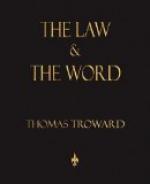A principle per se is always undifferentiated, and capable of any sort of differentiation into particular modes of expression that are not in opposition to the principle itself; and it is true of the Principle of Life as of all others. There is therefore no limit to its expression except that which inverts it,—that is to say, anything which tends towards Death; and, accordingly, what we have to avoid is the negative mode of Thought, which starts an inverted action of the Law, logically resulting in destructiveness instead of constructiveness. But the mistake we make from not seeing the basic principle of the whole thing, is that of looking to the conditions to form the Life, instead of looking to the Life to form the conditions; and therefore what we require is a Standard of Measurement for our Thought, by which we shall be able to form The Perfect Word which will set in motion the Law of Cause and Effect in such a manner as to fulfil that Basic Desire of Life which is common to all Humanity. The Perfect Word must therefore fulfil two Conditions—it must have the essential Quality of the Undifferentiated Eternal Life, and it must have the essential Quality of “Genus Homo.” It must say with Horace “Homo sum; nihil humani mihi alienum puto” (I am Man; I regard nothing human as alien to myself). When we think it out carefully, there is no escaping the conclusion that this must be the essential Quality of the Perfect Word we are in search of. It is the final logical inference from all that we have learnt regarding the interaction between Law and Personality, that the Perfect Word must combine in itself the Quality of each—it must be at once both Human and Divine.
Of course all my readers know where the description of such a Word is to be found; but what I want them to realize is the way in which we have now reached a similar description of the Perfect Word. We have not accepted it unquestioningly as the teaching of a scholastic theology, but have arrived at it by a course of careful reasoning from the facts of physical Nature and from our experience of our own mental powers. This way of getting at it makes it really our own. We know what we mean by it, and it is no longer a mere traditional form of words. It is the same with everything else; nothing becomes our own by being just told about it.




